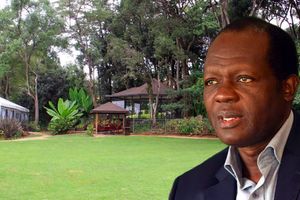
Auctioneers are made to sell expensive items at throwaway prices.
Desperate times call for desperate measures. Perhaps no one knows this better than Mombasa-based oil and gas tycoon Ibrahim Hussein Mahadi who might have used every trick in the book to save his Sh3.6 billion properties from the auctioneer’s hammer.
The court heard that in a bid to fend off auctioneers over a Sh2.3 billion credit facility, a cash-rich American shareholder of Akmat, a joint venture with Mahadi Energy, one of Ibrahim's three companies, had committed to clear the loan from Premier Bank. Premier Bank, a Shariah-compliant lender, had until April last year been trading as First Community Bank.
This shareholder was an American investment company known as Cashion Capital Institute LLC. Cashion Capital, which was reported to have a majority stake in Akmat, is said to have put together a war chest of $40 million (Sh5.16 billion) to pay off Premier’s loan and complete the construction of a 15,000-tonne Liquified Petroleum Gas (LPG) storage facility in Port Reitz, Mombasa for which Mahadi had taken the loan.
Thus, Akmat asked the court to be given 18 more months to pay off the loan, a request that was not granted.
However, Premier Bank, which had already auctioned off some of the properties, told the court the American shareholder didn’t exist.
As far back as 2011, Mr Mahadi had big dreams of joining the exclusive club of firms that import, store and distribute LPGs. This is a lucrative industry that has been dominated by billionaire Mohammed Jaffer’s African Oil Gas Terminal (Agol).
The LPG storage plant was to be built by Mahadi Energy on 8.5 acres of land at the port of Mombasa, next to the jetty and adjacent to the Standard Gauge Railway (SGR) line.
In 2020 First Community gave Mahadi a $15 million loan and an overdraft to buy equipment for constructing an LPG terminal in Mombasa. Mahadi, who runs and operates an inland container depot terminal at the port in Mombasa, would also allegedly take other loans from individual investors amounting to $4 million.
The $15 million facility from Premier Bank was given in the form of three Letters of Credit (LCs), which through a complex arrangement, would be repaid as a loan in two years.
An LC is a contractual commitment by the foreign buyer's bank to pay once the exporter ships the goods and presents the required documentation to the exporter's bank as proof.
The agreement was that in two years, Mahadi would find an investor to pay the loan and build the LPG terminal.
However, after two years, Mahadi had not found an investor to refinance the loan. But with Mahadi’s last and lucrative properties—three plots including a container depot situated at the port of Mombasa—about to be auctioned Akmat emerged.
In an application, Akmat's Managing Director Zahra Ali claimed that American investment firm Cashion Capital was putting together a financing package to pay off the debt and build the LPG terminal.
However, Premier Bank, through their legal manager Claris Ajwang Ogombo, said that upon perusal of the company’s registration documents, they learned that Cashion Capital was not a shareholder of Akmat.
“The entire application is built on false averments that the Plaintiff’s majority shareholder, Cashion Capital Institute LLC intends to settle the outstanding facilities owed to the 1st Defendant by the 2nd and 3rd defendants,” said Ogombo in her affidavit.
A search of the companies’ registry revealed that Akmat’s majority shareholder with 90 percent of the shares was actually Dr Zahra Ali and not Cashion Capital Institute as claimed, Ogombo told the court. Ibrahim’s Mahadi Energy owned the rest of the shares.
Premier Bank was not done accusing Akmat of concocting stories to delay the auction of Mahadi’s three plots in Mombasa valued at Sh3.6 billion (though Premier Bank insists this valuation has been exaggerated).
Ms Ogombo added that Akmat “annexed a series of questionable documentation to prove they have necessary funds to settle the debt including Letter of Guarantee from Santander, with the latter claiming it will release the investment funds to them.”
“It is interesting that the 19th largest banking institution in the world (Santander) misspelled the word “Guarantee” at the heading of the Irrevocable Letter of Guarantee,” she explained.
Akmat's was just one of the 15 applications argued by parties in 10 months, including disgruntled individual third parties who claim to have advanced Mahadi more than $4 million in what Premier Bank believes is a tactic to stop it from recovering the debt.
Mahadi’s properties that were to fall under the auctioneer’s hammer should he fail to pay the loan include three plots in Port Reitz, Mombasa County, on which he plans to build the gas terminal. There is also a family home in Nairobi’s South C and two vacant plots in Eastleigh, Nairobi County.
Save for one small plot in Mombasa County, the bank has since sold most of these properties. The court however has issued a status quo order stopping the transfer of the family home in South C estate pending a determination on whether this home is part of the collateral available for auction.
The two properties in Eastleigh were sold through a public auction on August 14, 2024, while the Mombasa properties were sold on September 4, 2024.
From the court papers, it is not clear whether Mahadi might have flown too close to the sun in his bid to build the multi-billion facility or he did not leave the ground in the first place.
What is clear is that Premier Bank, as well as at least two individual creditors, are scrambling for Mahadi’s properties, which are valued at around Sh3.6 billion.
Mahadi told the court that it had since concluded the project's financial feasibility, technical feasibility studies, and financial modelling. Mahadi also claims to have received all approvals and no objections from the respective authorities.
In March this year, the court gave Premier Bank the nod to auction the six properties—three plots in Port Reitz, two empty plots in Eastleigh and a family home in South C.
This triggered a wave of lawsuits and counter-lawsuits, not only from Ibrahim but also from other persons who claimed to have a stake in the properties, either as guarantors or investors.
Somalia’s Premier Bank took over First Community Bank in April 2023 and immediately sought to repair the bank’s battered loan book.







